Any dog can get a hot spot and they are one of the most common types of skin infections seen in dogs.
Hot spots are not pretty and they can be quite uncomfortable for a dog so it’s important to learn how to spot and treat a hot spot on your dog’s skin before it gets worse.
If you found a hot spot on your dog, don’t worry, we’ve got you covered!
What Are Hot Spots?
Hot spots are a common type of skin infection seen in dogs.
They are acute moist dermatitis that can often appear out of the blue and escalate quickly.
They can vary from dog to dog but in most cases, the skin gets red, moist and sometimes oozes.
They can be painful and quite irritating to a dog which causes them to bite, chew and scratch the affected area creating more inflammation and secondary infections.
Hot spots are sometimes difficult to get under control because they spread fast.

My Brown Newfies is a participant in the Amazon Services LLC Associates Program, an affiliate advertising program designed to provide a means for sites to earn advertising fees by advertising and linking to Amazon.com
Common Causes of Hot Spots
Hot spots can be caused by medical issues and insect bites such as:
- environmental and food allergies
- mosquito bites
- parasites such as fleas and ticks.
- unkempt coat
- humid weather
- swimming
- pain (possibly related to joint issues like hip dysplasia)
- anxiety
- underlying medical conditions such as thyroid issues , infected anal glands or a weak immune system.
Some breeds with thick coats like Newfoundlands, Golden Retrievers, St. Bernards, German Shepherds, Labrador Retrievers, and Rottweilers are predisposed to skin issues.
What Is Causing My Dog’s Hot Spots?
Hot spots are more likely to occur during warm weather and periods of high humidity which is why they are sometimes referred to as summer sores..
Dogs that are frequently wet from swimming, bathing, or inclement weather are more prone to developing hot spots due to the excess moisture held against the skin by their coats.
One day they can be the size of a dime and the next day they’ve taken over your dog’s entire belly.
Most hot spots are caused by an overgrowth of bacteria and they spread fast because dogs lick and chew them which often results in hair loss.
The important thing to do when treating a hot spot is to figure out the underlying cause which should be done by a veterinarian.
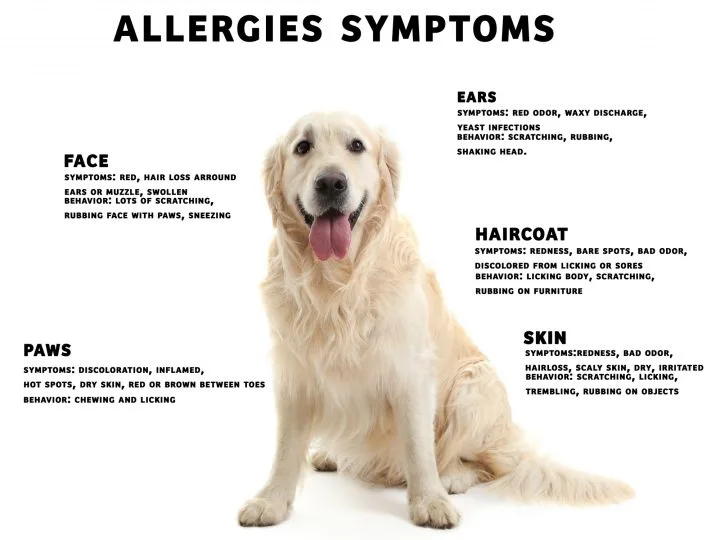
If you want to try to treat your dog’s hot spot from home there are a few home remedies that you can try BUT if the hot spot does not improve in a few days or gets bigger, your pet should be seen by a veterinarian.
Common Areas Hot Spots Are Found
Hot spots can pop up nearly anywhere on a dog but they can commonly be found in these areas:
- On a dog’s belly
- Neck
- Base of tail
- Front leg
- Back leg
- Under the ear
- Chest
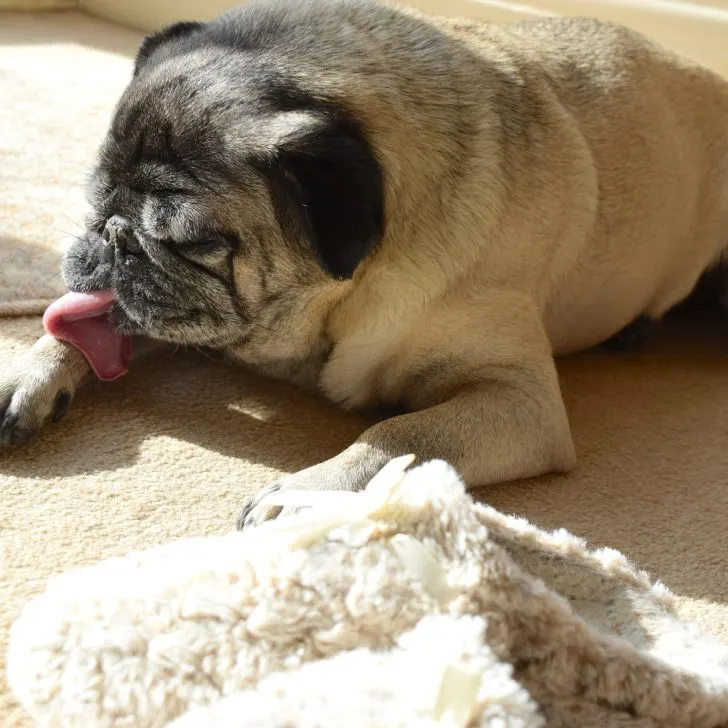
Home Treatment
If you can’t get to the vet right away and you’re wondering how you can treat your dog’s hotspot from home, I have good news for you, there are a few things that pet parents can use to start the healing process
- Trim the area around the hot spot with dog hair clippers. Try not to use scissors because you could do more damage than good. Clipping the area will allow the skin to breathe and it will keep extra moisture in the area
- Clean the skin with a mild, water-based antiseptic spray or wipe, or an antibacterial shampoo.
- Apply a safe hot spot treatment spray that is safe if ingested and will not burn.
- Keep your dog from licking, biting or scratching at the area.
- Monitor the hot spot for signs of healing.
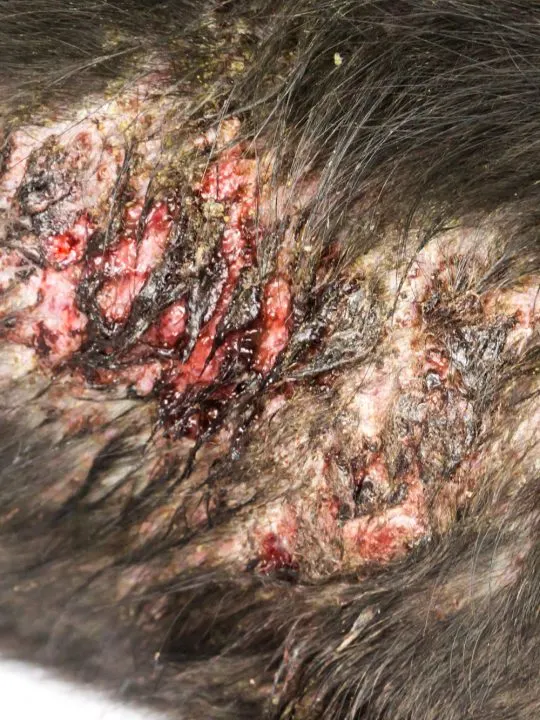
Best Products To Put On Hot Spots
Hibiclens is a product that is regularly available at most drug stores and is a good at-home remedy.
Douxo Chlorhexidine pads are ideal and pretty close to what most veterinarians will use and are available at some pet stores.
An over-the-counter hot spot treatment should be applied next.
Good choices for a hot spot spray are:
- Vetericyn Plus Antimicrobial Pet Hot Spot Spray
- Skin Tonic by Wondercide
- Tomlyn Antiseptic and Anti-Itch Hot Spot Spray (my personal favorite)
You can get some of these sprays at local pet stores, online or at Tractor Supply.
Gold Bond medicated powder and steeped green tea have also been recommended by several pet owners as good hot spot treatments also.
To use Gold Bond powder you can put a small amount on a clean makeup brush and apply to the affected area.
A key step in treating your dog’s hot spot from home is to keep them from bothering it.
Discourage excessive licking and scratching as best as you can.
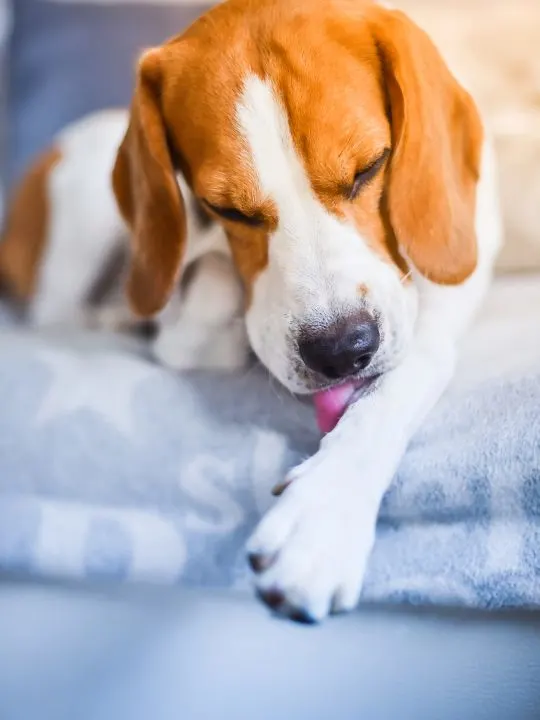
Some dogs may need to wear a soft collar to keep them from chewing and licking at the hot spot.
Many dog owners also use large t-shirts to keep their dog away from the hot spot but this will only work depending on the location of the infection.
Keep in mind that you want the hot spot to breathe so it’s not a good idea to cover the surface of the skin with something tight.
DO NOT USE ALCOHOL.
I would never, ever recommend using alcohol on any skin conditions.
Please promise me you won’t use it even if you read it on one of your dog forums which are loaded right now with hot spot threads.
Will a Dog Hot Spot Go Away On Its Own?
Sometimes hot spots will go away on their own but there’s also a lot that won’t without help from a veterinarian.
Chronic hot spots that just won’t go away may require oral steroids and/or oral and topical antibiotics that you can only get with your vet’s approval.
Prevention
Don’t worry, if you’re dealing with a hot spot on your dog, with appropriate treatment and care, hot spots can be preventable for most dogs.
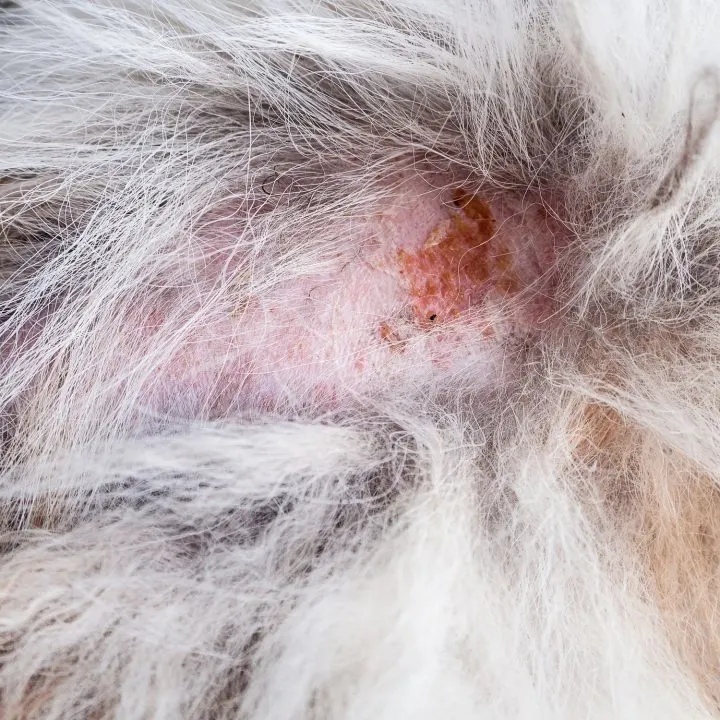
- Regular grooming and good hygiene can help keep hot spots at bay on dogs when there isn’t an underlying condition.
- Drying your dog’s body completely after giving them a bath or after they’ve been swimming during the summer months with a high velocity dog dryer can also help. (especially dogs with thicker coats)
- Make sure that you are taking preventative measures against fleas, ticks, and mosquitoes
- Maintain regular check-ups with your veterinarian.
- Try to address your dog’s anxiety and behavioral issues if present.
- Address the underlying issue that could be causing hot spots with your veterinarian.
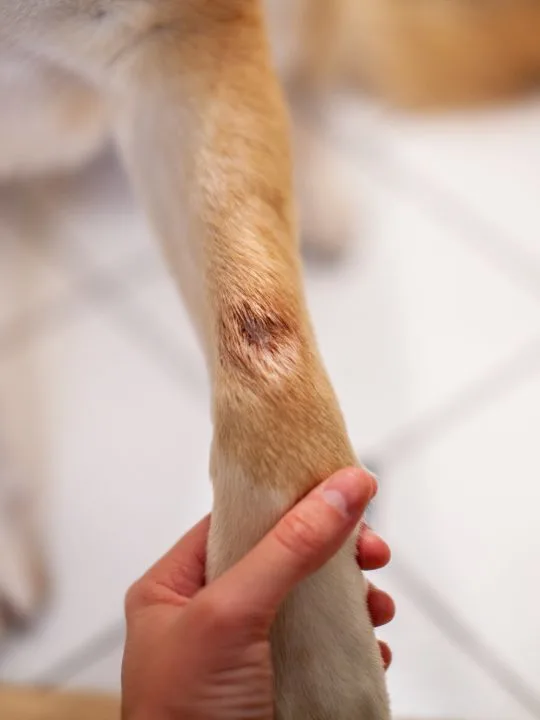
If you’re dealing with hot spots this time of the year, don’t worry, you’re not alone.
While Jen used to be a vet tech, the information in this post does not substitute for veterinarian advice.
Nic
Saturday 18th of September 2021
Our girl Luna was behaving in a way that was so out of sorts for her - excessive barking, aggressive behaviour and even trying to bite. We quickly realised there must be a cause as she’s such a sweet girl. A quick examination soon explained why as her belly had a few hotspots and she’d licked them and matted her hair over them. We’re treating them and she’s a healthy girl so she’ll be fine. Think it’s always worth trusting your fur baby - we know them and benefit of the doubt should tell us that if they’re behaving badly then there’s probably a good reason for it, once they’re beyond the teenage phase of course! X
Jen
Tuesday 28th of September 2021
I hope your sweet girl is feeling better now Nic!
Anna Gregory
Sunday 14th of July 2019
Third Newfie. First one with hot spots. He tends to get them in the same area and they tend to gunk quickly from the puss and hair. I took him in with what I believed to be allergies and my vet agreed. That being said I use bacitracin (my vet approved) and they are gone in a day with two applications. I cannot recommendation it enough. It has been what we use in our family for over 5 years. It is like neosporin but different in the it that it promotes scabbing not keeping a scab soft. Good luck.
Catherine Simms
Sunday 5th of August 2018
I will try those products. Our Lab's hot spot cost us $300.00 at the vet!
kkoira
Saturday 28th of July 2018
Flight had one just beginning a few weeks ago. Shaved the site and treated the area with hydrogen peroxide and it cleared up within a day, since it never really had a chance to get bad.
Jen
Friday 3rd of August 2018
That's awesome! I think that if I would of saw Sherman's hot spot 12 hours earlier that it wouldn't have gotten so bad!
Tails Around the Ranch
Friday 27th of July 2018
Great info; I'll have to check out those products and hope I don't have to deal with anything like that with either one of the poodles. Hot spots are definitely no fun from the sounds of it. Glad Sherman is recovering nicely. Happy weekend.
Jen
Friday 3rd of August 2018
I'm glad you haven't had to deal with them!